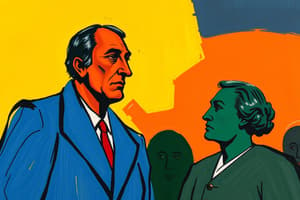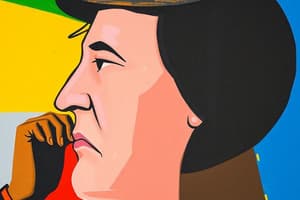Podcast
Questions and Answers
Summarize Justice Holmes's view on the role of judges in interpreting the Constitution, and how it contrasted with a strict adherence to legal theories.
Summarize Justice Holmes's view on the role of judges in interpreting the Constitution, and how it contrasted with a strict adherence to legal theories.
Holmes believed judges should respect laws made by elected officials unless they violate the Constitution and that the law should adapt to real-life experiences rather than sticking to strict legal theories.
In Schenck v. United States (1919), what legal principle did Justice Holmes introduce to justify limiting free speech during wartime?
In Schenck v. United States (1919), what legal principle did Justice Holmes introduce to justify limiting free speech during wartime?
Justice Holmes introduced the 'clear and present danger' test, which allows the government to restrict speech if it creates a clear and present danger to public safety.
Explain Justice Holmes's dissent in Lochner v. New York (1905) regarding economic regulation and the role of the judiciary.
Explain Justice Holmes's dissent in Lochner v. New York (1905) regarding economic regulation and the role of the judiciary.
Holmes argued that the Constitution does not protect a specific economic theory and that courts should defer to legislative decisions on economic policy unless laws clearly violate fundamental rights.
How did Justice Holmes's view in Lochner v. New York differ from the majority opinion regarding the government's power to regulate work conditions?
How did Justice Holmes's view in Lochner v. New York differ from the majority opinion regarding the government's power to regulate work conditions?
In West Coast Hotel Co. v. Parrish, what key constitutional question was addressed regarding minimum wage laws for women?
In West Coast Hotel Co. v. Parrish, what key constitutional question was addressed regarding minimum wage laws for women?
In West Coast Hotel Co. v. Parrish, how did the Supreme Court's ruling reflect a shift from earlier decisions like Adkins v. Children's Hospital?
In West Coast Hotel Co. v. Parrish, how did the Supreme Court's ruling reflect a shift from earlier decisions like Adkins v. Children's Hospital?
Summarize the key arguments of Justice Hughes in the majority opinion of West Coast Hotel Co. v. Parrish regarding the 14th Amendment's Due Process Clause.
Summarize the key arguments of Justice Hughes in the majority opinion of West Coast Hotel Co. v. Parrish regarding the 14th Amendment's Due Process Clause.
In Bradwell v. Illinois (1873), what was the central question regarding the Fourteenth Amendment that the Supreme Court addressed?
In Bradwell v. Illinois (1873), what was the central question regarding the Fourteenth Amendment that the Supreme Court addressed?
How did the Supreme Court's decision in Bradwell v. Illinois reflect the prevailing social norms of the time regarding women's roles?
How did the Supreme Court's decision in Bradwell v. Illinois reflect the prevailing social norms of the time regarding women's roles?
Explain the significance of the Slaughter-House Cases in the context of the 14th Amendment's protections of individual rights.
Explain the significance of the Slaughter-House Cases in the context of the 14th Amendment's protections of individual rights.
Summarize the central legal dispute in the Slaughter-House Cases and the butchers' argument against the Louisiana law.
Summarize the central legal dispute in the Slaughter-House Cases and the butchers' argument against the Louisiana law.
In the Slaughter-House Cases, what was the Supreme Court's reasoning for upholding the Louisiana law, despite its impact on other butchers?
In the Slaughter-House Cases, what was the Supreme Court's reasoning for upholding the Louisiana law, despite its impact on other butchers?
Briefly describe the dissenting opinion in the Slaughter-House Cases and its view on the state's police power.
Briefly describe the dissenting opinion in the Slaughter-House Cases and its view on the state's police power.
Effectively highlight the key constitutional questions in West Coast Hotel Company vs Parish?
Effectively highlight the key constitutional questions in West Coast Hotel Company vs Parish?
What was the argument of Myra bedwell when she applied to become a licenced lawer to the supreme court?
What was the argument of Myra bedwell when she applied to become a licenced lawer to the supreme court?
Flashcards
Holmes' Judicial Philosophy
Holmes' Judicial Philosophy
Justice Holmes advocated for a practical, flexible interpretation of the Constitution, respecting laws by elected officials unless they violated the Constitution and adapting law to real-life experiences.
Schenck v. United States (1919)
Schenck v. United States (1919)
In Schenck v. United States (1919), the Supreme Court established the principle that speech can be restricted if it creates a "clear and present danger."
Dangerous Speech
Dangerous Speech
Speech that intends to cause others to violate the law can be punished, especially during wartime, as it threatens national security.
Espionage Act Intent
Espionage Act Intent
Signup and view all the flashcards
Limits of Free Speech
Limits of Free Speech
Signup and view all the flashcards
Lochner v. New York (1905)
Lochner v. New York (1905)
Signup and view all the flashcards
Judicial Deference
Judicial Deference
Signup and view all the flashcards
Regulation of Businesses
Regulation of Businesses
Signup and view all the flashcards
Freedom of Contract
Freedom of Contract
Signup and view all the flashcards
Holmes on Government Power
Holmes on Government Power
Signup and view all the flashcards
West Coast Hotel Co. v. Parrish
West Coast Hotel Co. v. Parrish
Signup and view all the flashcards
Key Questions in Parrish Case
Key Questions in Parrish Case
Signup and view all the flashcards
Limits to Contract Rights
Limits to Contract Rights
Signup and view all the flashcards
Bradwell v. Illinois (1873)
Bradwell v. Illinois (1873)
Signup and view all the flashcards
Arguments in Bradwell Case
Arguments in Bradwell Case
Signup and view all the flashcards
Study Notes
- Justice Oliver Wendell Holmes interpreted the Constitution practically and flexibly.
- Holmes believed that judges should respect laws enacted by elected officials unless they violated the Constitution.
- Holmes thought law should adapt to real-life experiences, rather than sticking to strict legal theories.
Schenck v. United States (1919)
- The case was about the limits of free speech.
- Holmes wrote the majority opinion, ruling 9-0 to uphold Charles Schenck's conviction.
- Schenck was convicted for distributing leaflets that urged people to resist the military draft during World War I.
- Schenck's actions were not protected by the First Amendment.
- Holmes introduced the "clear and present danger" test, restricting speech that creates such a danger.
- Holmes viewed free speech as important but not unlimited, especially when it threatened public safety.
- The leaflets were intended to stop people from following the draft law, posing a threat to national security during wartime.
- Even if Schenck's pamphlets did not stop anyone from being drafted, the intent to encourage draft resistance was illegal under the Espionage Act.
- Holmes argued that free speech has limits, particularly during wartime when it poses a real danger to the country.
Lochner v. New York (1905)
- The case involved defending government power over business.
- Holmes dissented from the majority, who favored Lochner.
- Joseph Lochner, a bakery owner, was fined for violating the bakeshop law of 1895 (limiting bakers to 10 hours a day or 60 hours a week).
- Lochner argued that the law violated his right to freely make contracts under the 14th Amendment.
- In a 5-4 ruling, the Court said the law was unconstitutional because it interfered with freedom of contract.
- Holmes disagreed with the majority and believed the state had a valid reason to limit bakers' working hours.
- The Constitution does not protect a specific economic theory.
- The Court was treating free-market capitalism as if it were part of the Constitution, but the 14th Amendment was not meant to enforce one economic ideology.
- Laws like the bakeshop law were reasonable regulations that states had the right to pass.
- The government has the power to regulate work conditions.
- Many laws already regulated businesses for public welfare, such as child labor laws and safety laws.
- If bakers' long working hours were unhealthy, then New York had the right to protect workers' health.
- The Court should respect legislative decisions.
- Judges should not impose their personal views about economic policy, and courts should defer to elected legislatures as along as laws do no violate fundamental rights.
- The Court was overstepping by striking down the law, interfering in something that the people's representatives in the state government should decide.
- Holmes believed the government had the power to regulate work conditions and that courts should defer to legislatures on economic matters.
- Holmes's dissent became influential when the Court shifted towards supporting worker protections in the 1930s.
West Coast Hotel Company vs. Parrish
- The vote was 5-4 in favor of Elsie Parrish.
- Justice Hughes wrote the majority opinion, and Justice Sutherland wrote the dissenting opinion.
- The hotel lost and was required to pay Parrish the wages she was owed.
- The constitutional questions involved the minimum wage law in Washington, specifically fixing the minimum wage law for women and minors.
- Elsie Parrish, an employee of West Coast Hotel, sued to recover the difference between her wages and the state's minimum wage ($14.50 per week of 48 hours).
- The hotel argued that the law violated the freedom of contract protected under the due process clause of the 14th Amendment.
- The ruling, with a 5-4 decision, stated that the law did not violate the due process clause.
- Justice Hughes stated that freedom of contact is not absolute and that states can regulate wages to protect workers from exploitation.
- Sutherland argued that the ruling infringed on individual liberty and undermined prior precedent.
- The government should not interfere in private employment contracts unless necessary.
- Overturned Adkins v. Children's Hospital (1923), which had struck down a similar minimum wage law for violating freedom of contract.
- The end of the Lochner era and the Court's shift towards upholding New Deal legislation were marked by this.
- The key constitutional questions were whether a state minimum wage law for women violated the liberty of contract protected by the Due Process Clause of the 14th Amendment, and whether states can regulate wages as part of their police powers to protect workers and promote the general welfare.
- Hughes used the 14th Amendment's Due Process Clause, stating that while people have rights, those rights are not unlimited.
- States can step in and make laws to protect workers, like setting a minimum wage, even if it affects the freedom to make contracts.
- The Due Process Clause does not mean employers and employees have the right to make any contract without limits, especially if it hurts the workers.
- Sutherland believed that the 14th Amendment's Due Process Clause should protect freedom of contract.
- Setting a minimum wage for workers was deemed an unnecessary government control over private agreements between employers and workers.
- The Court agreed with Hughes, so the law stood, and the hotel had to pay Elsie Parrish the wages she was owed.
Bradwell v. Illinois (1873)
- An 8-1 vote rejected Bradwell's claim that Illinois' refusal to permit her to practice law violated her constitutional rights.
- Justice Miller wrote the majority opinion.
- Myra Bradwell argued that she was entitled to practice law in Illinois under the 14th Amendment of the Constitution.
- The court refused her license, stating that the legislature never intended for women to enter the legal profession.
- Matthew Carpenter argued that the 14th Amendment guaranteed all citizens, regardless of sex, the right to pursue any lawful profession.
- He contended that barring women from the legal field was unconstitutional as racial discrimination.
- Justice Miller ruled that the 14th Amendment did not guarantee a right to practice law and that states had the authority to regulate admission to the bar.
- The Court upheld Illinois' decision, reinforcing gender-based legal barriers in professional fields.
- The key constitutional question was whether Illinois' refusal to grant Myra Bradwell a law license violated the Privileges or Immunities Clause of the Fourteenth Amendment.
- The Supreme Court ruled 8-1 against Myra Bradwell, upholding Illinois' decision to deny her admission to the bar.
- The Court rejected Bradwell's argument that practicing law was a fundamental right protected by the Privileges or Immunities Clause of the Fourteenth Amendment.
- The opinion relied on Slaughter-House Cases (1873), which narrowly interpreted the clause, stating that it only protected rights associated with federal citizenship, not state-conferred privileges like a law license.
- The regulation of professions was a state matter, giving Illinois the authority to set its own bar admission rules.
- Justice Bradley argued that women's primary role was in the home and stated that the legal profession was unsuited for women due to their ‘delicate structure’.
- Bradley reaffirmed traditional gender roles, stating that men were the natural providers and protectors, while women were meant for motherhood and marriage.
- Justice Chase was the only dissenter, but he did not write a formal opinion.
- The case reinforced gender-based discrimination in the legal profession and highlighted the limits of the Fourteenth Amendment's Privileges or Immunities Clause.
- It was later effectively overturned by Reed v. Reed (1971) and Frontiero v. Richardson (1973), which established stronger protections against gender discrimination under the Equal Protection Clause.
Slaughter-House Cases
-
The vote was 5-4.
-
The cases were about whether Louisiana's 1869 law, which gave one company a monopoly on slaughtering animals in New Orleans, was unconstitutional.
-
The law said that only this one company could run slaughterhouses in certain areas, and all butchers had to pay to use its facilities.
-
The state argued this was necessary for public health, but local butchers sued, saying the law violated their rights under the 13th and 14th Amendments.
-
The Court ruled that the 14th Amendment was meant to protect the rights of formerly enslaved people and not guarantee equal economic rights for all citizens.
-
This decision limited the power of the 14th Amendment in protecting individual rights against state laws.
-
Justice Miller wrote the opinion), and Chief Justice Chase supported the law, while Justice Field and Justice Bradley opposed the law in their dissents.
-
The case weakened the 14th Amendment's protections for individual rights and helped states maintain control over businesses.
-
The case challenged the law requiring butchers in a large city to slaughter their cattle only at a specific slaughterhouse, which the butchers argued restricts their trade, infringes on their liberty, and grants a monopoly to the owner of the slaughterhouse.
-
The butchers argued that the law created an arbitrary restriction, amounting to a monopoly that interfered with their ability to operate freely.
-
The constitutional questions were whether the law violated the right to due process under the Fourteenth Amendment and equal protection by granting exclusive rights to a private entity.
-
it also questioned whether the actions could be considered a monopoly infringing economic liberty.
-
The Court had to consider whether the law constituted a police regulation (regulations for health and safety) which could be enacted by the state.
-
The Court ruled in favor of the butchers, striking down the law as onerous, unreasonable, arbitrary, and unjust.
-
The regulation granted a monopoly to a private company but did not serve a legitimate public health or safety purpose.
-
The law violated the Due Process Clause of the Fourteenth Amendment.
-
The Court reasoned that regulating slaughterhouses for public health and safety went too in granting exclusive rights to a single company, creating a monopoly and unwarranted infringement on economic liberty.
-
Key Constitutional Principles:
- Due Process (14th Amendment): The Court found that the law violated the due process rights
- The ruling reinforced the principle that individuals have the right to engage in lawful economic activities without undue government interference or monopolistic practices.
- The law was criticized for granting an exclusive privilege, which raised concerns.
-
The Court ruled against the law because it found it unjust, arbitrary, and an undue restriction on the butchers' economic freedom.
-
The decision affirmed that laws violate constitutional principles of liberty and due process.
Studying That Suits You
Use AI to generate personalized quizzes and flashcards to suit your learning preferences.




